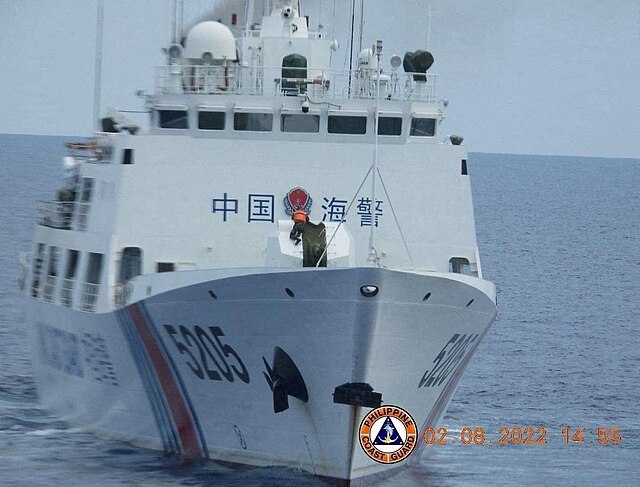Tensions flared once again in the South China Sea this week after the Philippines accused China of aggressive maneuvers near the contested Scarborough Shoal. Philippine officials said Chinese coast guard vessels fired water cannons and sideswiped a patrol vessel, actions they described as reckless and provocative. Beijing countered that its coast guard was enforcing Chinese law in its claimed waters.
The incident occurred Wednesday as three Philippine vessels from the coast guard and Bureau of Fisheries and Aquatic Resources were conducting what officials described as a routine patrol. According to Philippine officials, Chinese coast guard vessels approached the ships aggressively, targeting the BRP Datu Pagbuaya with water cannons and intentionally colliding with it. Video footage released by Philippine authorities appears to show these actions.
The Chinese maritime maneuvers "are not standard law enforcement actions" and "should be interpreted as unlawful aggression by international law violators," Philippine Coast Guard Commodore Jay Tarriela said. He added that such actions reflect a broader pattern of coercion and intimidation in Philippine waters.
China, however, offered a different narrative. Liu Dejun, a spokesperson for the Chinese Coast Guard, stated that four Philippine vessels had "dangerously approached" Chinese patrol ships engaged in normal law enforcement operations near the Scarborough Shoal. He added that one Philippine vessel ignored repeated warnings and performed maneuvers that "seriously threatened" the safety of a Chinese coast guard vessel. "We warn the Philippines to immediately stop infringement, provocation, and propaganda, otherwise it will be responsible for all consequences," Liu said.
The Scarborough Shoal, known as Huangyan Island in China, has long been a flashpoint in the South China Sea. Beijing claims nearly the entire waterway as part of its territory, but these claims overlap with the exclusive economic zones of the Philippines and other Southeast Asian nations. In 2016, an international tribunal ruled that China's claims in the Scarborough Shoal had no legal basis, but Beijing has refused to recognize the ruling.
The United States condemned China's actions, with U.S. Ambassador to the Philippines MaryKay Carlson saying on X, formerly Twitter, that the maneuvers disrupted Philippine maritime operations and endangered lives. "We condemn these actions and stand with our like-minded friends, partners, and allies in support of a free and open Indo-Pacific," Carlson wrote.
Philippine officials said despite the incident, they remain committed to protecting their maritime jurisdiction. The Philippine Coast Guard and the Bureau of Fisheries and Aquatic Resources said in a joint statement they renewed their "commitment to protecting the rights and safety of our fishermen within our maritime jurisdiction."
On Wednesday, Philippine authorities detailed the incident further, saying the BRP Teresa Magbanua had also been subjected to "blocking, shadowing, and dangerous maneuvers" by Chinese vessels. A third Philippine vessel, the BRP Cabra, faced similar actions at a distance of about 300 yards, officials said.
China escalated the dispute earlier this week by submitting nautical charts to the United Nations outlining its territorial claims around the Scarborough Shoal. The Philippines dismissed the submission as "baseless" and "illegal." Alexander Lopez, spokesperson for the Philippines' National Maritime Council, said, "The aggressive posture of the Chinese vessels highlights a continuing pattern of aggression, coercion, and intimidation within Philippine waters."
Efforts to establish a code of conduct between China and the Association of Southeast Asian Nations (ASEAN) have made little progress, as Beijing continues to assert its dominance in disputed waters. China says it supports the code but does not recognize the 2016 tribunal ruling, further complicating negotiations.






